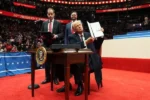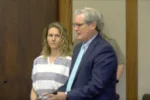In Washington, D.C., a big decision is being made by a federal judge about how the government spends money. Recently, there was a freeze on certain funds, which means some programs couldn’t get the money they needed. This freeze has caused a lot of confusion and worry among different groups, especially nonprofits that help people. The judge, Loren L. AliKhan, is looking closely at the arguments from both sides to decide what should happen next. In this story, we’ll explore why this spending freeze is so important and what it means for everyone involved.
| Aspect | Details |
|---|---|
| Court | U.S. District Court, Washington, D.C. |
Understanding the Government Spending Freeze
In recent events, a federal judge has put a hold on a government spending freeze that was ordered by the Trump administration. This freeze was meant to cut funding for various programs, which caused a lot of confusion and concern among agencies. Many were worried about how this would affect important services, like healthcare and education. The judge’s decision to pause the freeze means that the funding will continue for now, allowing these services to operate without interruption.
The Office of Management and Budget (OMB) argued that the freeze was no longer in effect, but the judge was not convinced. During the court hearings, it became clear that there were still questions about how the funding would be managed. The plaintiffs, which include nonprofit organizations, expressed worries that the freeze might still affect their funding in the future. The judge’s ruling helps to protect these important services while the legal discussions continue.
Court Hearings and Legal Arguments
In the courtroom, both sides presented their arguments about the spending freeze. The plaintiffs claimed that the government was not being clear about its intentions and was still following a policy of freezing funds without proper communication. They expressed concern that this would hurt many organizations relying on government support. The judge listened carefully to both sides but seemed to find the plaintiffs’ concerns more convincing, especially when it came to the government’s unclear communication.
The judge also noted the difficulty in interpreting the government’s memos, which added to the confusion about the freeze. The OMB attorney tried to argue that the freeze was no longer a problem, but the judge felt there were still issues that needed to be resolved. This back-and-forth in the courtroom is important because it shows how legal decisions can impact funding for various programs and organizations, making it vital for everyone to understand the implications of these rulings.
The Importance of Judicial Decisions on Funding
Judicial decisions play a crucial role in how government funding is managed. When courts decide to pause or allow spending freezes, it can directly affect services that many people rely on. For example, if a funding freeze happens, organizations like schools and nonprofits might not have enough money to provide their services. This is why the recent court ruling to maintain the pause on the spending freeze is so significant—it ensures that necessary funds continue to flow to these important programs.
Additionally, the legal discussions surrounding funding are not just about money; they are about accountability and transparency in government actions. When a judge questions the clarity of government policies, it highlights the need for clear communication between the government and the public. Understanding these legal processes helps citizens recognize the importance of judicial oversight in protecting vital services and ensuring that government actions are fair and justified.
Understanding the Spending Freeze and Its Implications
The recent court hearing highlights the complexities surrounding the federal government’s spending freeze, initially prompted by an OMB memo that sought to implement President Trump’s directives. This freeze has created uncertainty, particularly for nonprofit organizations reliant on federal funding. The judge’s refusal to lift the freeze underscores the potential for ongoing disruption, as the plaintiffs argue that the government’s policy could continue under different guises, maintaining the pressure on essential services.
The implications of this spending freeze extend beyond immediate financial concerns; they raise questions about administrative accountability and transparency. Nonprofit organizations like the National Council of Nonprofits are worried about the long-term effects on their operations and the communities they serve. Without clarity on funding, these organizations face challenges that could hinder their ability to deliver vital services, creating a ripple effect throughout the social support system.
Legal Perspectives on the OMB’s Actions
From a legal standpoint, the actions of the Office of Management and Budget (OMB) have drawn scrutiny, particularly in how they align with established protocols for federal funding. The judge’s comments during the hearing reflect a deeper concern about the interpretation of executive orders and memos, suggesting a lack of clarity that could potentially undermine legal standards. This situation raises critical questions about the authority of the OMB and its adherence to procedural norms when implementing spending policies.
Moreover, the request for a bond from the plaintiffs adds another layer to the legal debate. Traditionally, such requests are uncommon, especially from the government, indicating a potential shift in how federal agencies might operate in contentious funding disputes. This unusual move has sparked skepticism from the court, highlighting the need for a thorough examination of the legal precedents that govern these types of cases.
The Role of Nonprofits in the Funding Debate
Nonprofit organizations play a vital role in advocating for community needs, and their involvement in the current funding freeze debate is crucial. As the plaintiffs in this case, they represent not only their interests but also those of countless individuals who rely on their services. Their arguments emphasize the importance of consistent funding for social programs and the detrimental effects that abrupt financial disruptions can have on vulnerable populations.
Additionally, the nonprofit sector’s response to this funding freeze illustrates the broader implications for civil society. By challenging the government’s actions, these organizations strive to ensure that their voices are heard in policy discussions. Their participation in this legal battle not only aims to secure their funding but also seeks to uphold the principle of accountability in government spending, reinforcing the idea that public funds should support the common good.
Future Outlook: Navigating Uncertainty in Federal Funding
As the judicial proceedings continue, the uncertainty surrounding federal funding remains a key concern for many stakeholders. The judge’s upcoming ruling on the preliminary injunction will be pivotal in determining whether the funding freeze will persist or be lifted. This decision will have significant implications for both the government and the nonprofit sector, influencing how federal funds are allocated in the near future.
Looking ahead, it will be essential for nonprofits and other affected parties to remain vigilant and engaged in the ongoing discussions about federal spending policies. The outcome of this case could set important precedents regarding how administrative actions are implemented and challenged in court. As such, the need for clear communication and collaboration between government agencies and nonprofit organizations will be vital to ensure that community needs are met amidst the challenges posed by funding freezes.
Frequently Asked Questions
What is a spending freeze and why do governments use it?
A **spending freeze** is when a government stops spending money on certain programs. They use it to save money or to decide which programs are most important.
Who are the National Council of Nonprofits (NCN) and why are they involved in this case?
The **National Council of Nonprofits (NCN)** is a group that helps nonprofit organizations. They are involved because they want to make sure their funding is not unfairly cut.
What did the judge decide about the spending freeze?
The judge decided to keep the **temporary order** that stops the spending freeze from happening. This means the freeze cannot be enforced for now.
How do government lawyers argue for the spending freeze?
Government lawyers say the spending freeze is necessary to **review** and **reallocate funds**. They believe it helps make better decisions about where the money goes.
What does the term ‘preliminary injunction’ mean?
A **preliminary injunction** is a temporary court order that stops someone from doing something until a final decision is made. It helps prevent harm while the case is being decided.
Why did the judge mention the language in the memo was important?
The judge said the **language** in the memo is important because it helps understand what the government meant. Clear words can change how rules are followed.
What happens next in this legal case?
Next, the judge will make a decision about if the spending freeze can continue or if it should be lifted completely. This will happen after further review.
Summary
The content discusses a federal court hearing regarding a government spending freeze initiated by the Trump administration. The judge upheld a temporary restraining order despite the administration’s claims that the freeze was no longer a concern. The plaintiffs, represented by the National Council of Nonprofits, argued that the government’s approach to funding was still problematic, fearing a continuation of the freeze policy. The hearing highlighted disputes over a Q&A issued by the government, which the plaintiffs deemed ineffective. Ultimately, the judge did not reach a decision, maintaining the existing order while considering the requests for a preliminary injunction.







